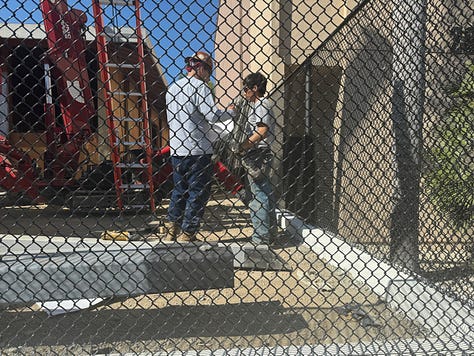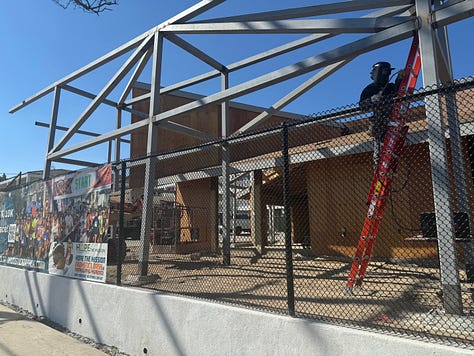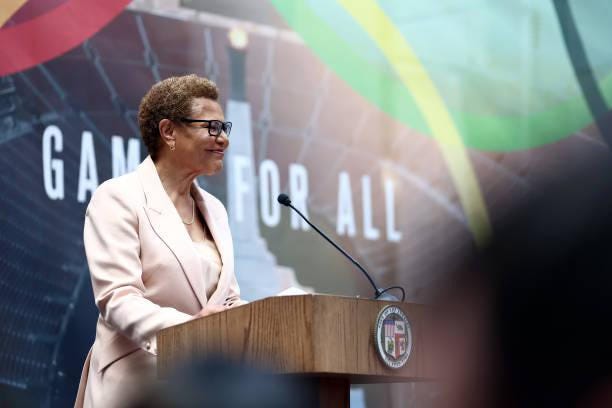California’s two leading political figures are sending mixed signals on how to confront the homeless crisis where more than one hundred seventy thousand residents are unhoused.
Governor Gavin Newsom is ordering a crackdown on homeless encampments across the state following the US Supreme Court’s ruling that cities can fine or jail unhoused people sleeping outside even if there is no shelter available.
Los Angeles Mayor Karen Bass says the “court’s ruling must not be used as an excuse for cities to arrest their way out of this problem or hide homelessness in neighboring cities or in jail.”
When the Olympics come to L.A. in 2028, Bass has pledged not to bus homeless people out of town, which the French did before the Paris Olympics. “The strategy involves housing people first,” said Bass.
The local plan includes creation of twenty-three places which provide Interim Housing around the city and county - they don’t call them shelters anymore! In total, these sites will house 2700 beds for men, women, and children, who are all currently living outdoors.
Three meals a day will be delivered to all of these residences.
Each of these residences will have twenty-four hour security.
This is one of the most aggressive housing policies ever attempted in Los Angeles. If it works, others may copy it. It’s kind of a mini Great Society program. An experiment in government problem solving. It involves money, manpower and management.
Since much of L.A. has become a news desert, most people have no idea this effort is being launched around them.
Karen Bass is uniquely qualified to deal with this moment in L.A. history. She grew up in the city’s center. Took on drug dealers and drunks in her hood. Likable, smart and pretty she was a leader in Sacramento and Washington. Then she got elected mayor. Now she’s on the cutting edge of an issue that is eating away at many urban areas across the country.
Already in some neighborhoods, these interim housing projects are not being welcomed by permanent residents. But local officials do not have the power to override a court order to deal with homelessness.
One of the most ambitious projects to reduce homelessness in L.A. is happening on Ventura Boulevard in Woodland Hills where several major business properties were purchased for twenty eight million dollars in public funds.
The 818 Hotel used to be located here - now this large property has been turned over to one hundred homeless families. Each room has bunk beds that will serve families with children up to the age of 18. They receive three meals a day, which get delivered. Other services are also being made available.
These bicycles at the property belong to children who used to be homeless. Now the kids are sleeping inside. Next door a community and day care center are being built to serve families on the site which used to house a Denny’s restaurant at Winnetka and Ventura Boulevards.



Some local residents have complained about putting this kind of project across the street from Taft High School.
Hope the Mission, a non profit , is managing this project. It’s sort of a double whammy, by reducing homelessness and also providing jobs in construction and food preparation and delivery.
Just 5 miles away on Ventura Boulevard in Encino the city has purchased this motel for seven million dollars. The Oak Tree Inn property will close escrow in October.
This interim housing site will serve homeless young men and women between the ages of eighteen to twenty-four. It will offer a full menu of services: drug counseling, job placement mental health services and anger management.
The thirty-eight people who will move into these former motel rooms were living on the streets or in cars or under freeways. They will receive transitory housing, three meals a day and be encouraged to look for employment.
Most Encino residents haven’t heard about the Oak Tree Inn being sold, and that Hope the Mission will be running the project.
The Encino Property Owners Association President Rob Gloshon said he doesn't oppose this project, but his group has concerns about the "potential public safety impact" of this motel conversion, and they are "establishing a committee of concerned residents to monitor and work with the operator."
A federally required count claimed more than forty thousand people are homeless within the City of Los Angeles and about thirty thousand more in L.A. County.
"When you have seventy thousand people living outdoors in a major place like Los Angeles, that is a catastrophe and it requires a FEMA type response,” added Ken Croft of Hope the Mission.
In effect, these transitional projects will de-centralize local government by delivering some services to people who need them.
“We are targeting people who have hit rock bottom,” said Ricky Angel, an aide to City Council member Nithia Raman.
The billions already spent by public agencies dealing with homeless encampments have not made a dent in the problem.
Mayor Karen Bass is calling on L.A.’s wealthiest citizens and companies to donate millions of dollars so that properties can be acquired.
Hollywood mogul Jeffery Katzenberg and philanthropist Stephen Cloobeck have donated large sums.
While political leaders wrestle with this problem, the Rescue Mission of the San Fernando Valley has been providing the basics of life to homeless people for nearly a decade. All week long, they serve Valley neighborhoods offering a mobile bathroom, clean clothes and toilet articles.
We featured this service over five years ago in my PBS SoCal series “The Drive By Economist.” The faces may have changed but the pain of being homeless is still very much with us.
Full disclosure: I have contributed funds to Hope the Mission and have encouraged others to contribute to the Rescue Mission of the San Fernando Valley.
If you would like to donate their websites are:
https://hopethemission.org
https://sfvrescuemission.org
Doug Kriegel - TV News Diary
Tune in next week!










Doug, I do not oppose this project but rather have publicly stated that it is allowed “by right” in accordance with commercial zoning. There are potential public safety impacts which is why EPOA is establishing a committee of area residents to monitor and work with the operator.